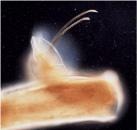What is lungworm?
posted 24 Feb 2014, 03:20 by Victoria L [ updated 9 Mar 2014, 17:26 ]
 The lungworm Angiostrongylus vasorum (also known as French Heartworm) is a parasite that infects dogs. The adult of this particular lungworm lives in the heart and major blood vessels supplying the lungs, where it can cause a host of problems. Left untreated, the infection can often be fatal.
The lungworm Angiostrongylus vasorum (also known as French Heartworm) is a parasite that infects dogs. The adult of this particular lungworm lives in the heart and major blood vessels supplying the lungs, where it can cause a host of problems. Left untreated, the infection can often be fatal.
The lungworm parasite is carried by slugs and snails. The problem arises when dogs purposefully or accidentally eat these common garden pests when rummaging through undergrowth, eating grass, drinking from puddles or outdoor water bowls, or pick them up from their toys.
Foxes can also become infected with the lungworm, and have been implicated in the spread of the parasite across the country.
 There are two main problems caused by dogs becoming infected with lungworm:
There are two main problems caused by dogs becoming infected with lungworm:
1. Infection with lungworm can cause serious health problems in dogs, and is often fatal if not diagnosed and treated.
2. Dogs infected with lungworm spread the parasite into the environment, as the larvae of the parasite are expelled in the dog’s faeces. This increases the chances of other dogs becoming infected.
Dogs of all ages and breeds can become infected with lungworm. However, younger dogs seem to be more prone to picking up the parasite. Dogs known to eat slugs and snails should also be considered high risk.
Lungworm infections can result in a number of different signs which may easily be confused with other illnesses. If your dog is displaying any of the signs below, consult your veterinary surgeon immediately.
There are some dogs which don’t initially show outward signs of lungworm infection. If you are concerned your veterinary surgeon can perform tests which may help detect if your dog is infected with the lungworm parasite.
Breathing problem
Coughing
Tiring easily
Poor blood clotting
- Excessive bleeding from even minor wounds/cuts
- Nose bleeds
- Bleeding into the eye
- Anaemia (paleness around the eyes and gums)
General sickness
- Weight loss
- Poor appetite
- Vomiting
- Diarrhoea
Changes in behavior
- Depression
- Tiring easily
- Seizures (fits)
Prevention & treatment
Thankfully, treatment of lungworm infection in dogs is widely available and easy to administer. Once diagnosed and treated, most dogs make a full recovery. The key to successful treatment is taking action early.
If you are concerned your dog has picked up, or is at risk from, picking up a lungworm infection, speak to your veterinary surgeon without delay.
Speak to your vet about ways to prevent this parasite.

